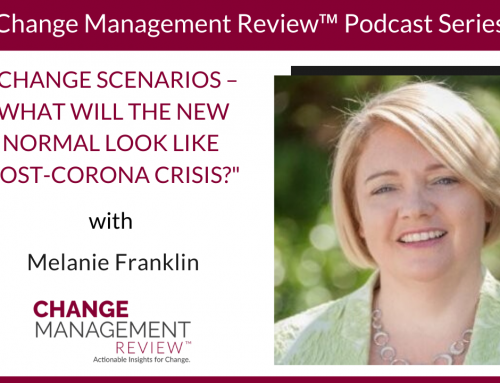As with other recognized professions—medicine, law, accounting, and engineering to name a few—for change management, the writing is now on the wall.
Whether you are new to the change management profession, considering joining the profession, or an experienced change management practitioner, the question of whether or not to get certified as a change management professional is probably on your mind.
This is an exciting time for the change management profession. It is formalizing, standardizing, and certifying. These activities have been evolving over the past 15 years starting with the Change Management Institute (CMI) in Australia developing the first change management Competency Model, an Organizational Change Maturity Model, and, with APMG, a Change Management Body of Knowledge (CMBoK) which form the basis for the CMI/APMG accreditation programs.
The forward movement of the change management profession parallels the acceleration of change in the workplace. As with other recognized professions—medicine, law, accounting, engineering to name a few—for change management, the writing is now on the wall.
As we move further into the 21st century and change continues to accelerate, it is clear that organizations who practice change management are better prepared for the future and now looking to tout organizational agility as their next organization-wide competency.
In the 1990s and into the early 2000s, more and more organizational work turned into project work (generally the introduction of new systems, processes, lines of business and more efficient business practices). It became apparent that companies who valued project management would adapt, survive and thrive. And so the Project Management Institute (PMI) stepped up and developed its Project Management Professional (PMP) certification program.
The program delivered many project and program management professionals to a marketplace hungry for the quality of the services they could provide. According to PMI, their PMP certification increased earning potential significantly. Their 2013 Salary Survey indicated that PMP certified project managers in the US make an average of 20% more than non-certified project managers.
Having certification and the letters Change Management Professional (CMP) behind your name is not so much a process of becoming part of an exclusive club as it is a process of providing formal recognition for the value that change management professionals bring to organizations—helping them to accelerate the implementation of business strategies and realize intended results for their customers.
Credentialing organizations recognize several benefits from pursuing a certification:
- An individual’s having greater confidence in their own competence and a competitive edge among their peers
- Possessing a job asset that is portable, as well as recognized and valued by potential employers
- Displaying an outward symbol that you are committed to the profession, its standards, and to learning as a lifelong pursuit
Certification is definitely a hallmark of a profession in positive transition.
At this point the notion of “grandfathering” may come into play. Grandfathering may be a uniquely USA term but there are parallels in other countries, especially in terms of building codes and businesses. Having a defined set of knowledge, skills, and proven experience could allow individuals who have been part of the change management profession for most of their working lives to achieve the credentials without a costly course of training and certification other than the cost to take relevant examinations.
But not without work. When the Performance Consulting profession established its credentialing system in the early 2000s, it laid out a process for experienced practitioners to achieve their CPT (Certified Performance Technologist) certification. ISPI (the credentialing association) required practitioners to supply proof of related degrees and training as well as a detailed description of several projects which matched ISPI’s criteria for appropriate application of the discipline and where the consulting intervention resulted in improved performance.
What will the future state of change management certification look like? Currently there are many change management certifications that vary widely as to what they certify. Likely these will be accepted for a period of time until the amalgamation of, or alignment of, standards-making bodies and their standards result in one dominant global accreditation or credential.
Interestingly, it may well be that international corporations will help to drive that process as a way of:
- Facilitating recruitment and hiring processes
- Streamlining development costs for personnel
Whatever shape it takes, it would appear that credentialing for change managers as an important component of their professional resume is coming. The costs for the practitioner are time and money, but the value gained for both the practitioner and the profession is immeasurable.




